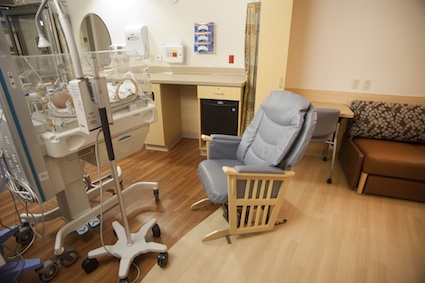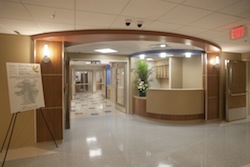Family-Oriented Newborn Intensive Care Unit Opens Doors

MILWAUKEE — Columbia St. Mary’s recently opened its new $3.5 million newborn intensive care unit, designed to set a new standard of care for premature and ill infants in southeastern Wisconsin.
The facility — the first all-private-room newborn intensive care unit in southeastern Wisconsin — is a part of Columbia St. Mary’s five-year plan to renovate its Women’s Hospital and consolidate inpatient and outpatient services for women, infants and children at one convenient location.
“This new model of care is proven to improve health and reduce the number of days spent in the hospital for premature infants, all while increasing family satisfaction,” said John Wolf, neonatologist and medical director of the Newborn Intensive Care Unit at Columbia St. Mary’s Hospital Milwaukee. “The all-private room [unit] will reduce the risk of infection, reduce stress through noise and light control and provide more privacy for patients and their families.”
The hospital reports that one in eight babies in the U.S. are born prematurely.
“For these special babies, the NICU is their first home,” said Patricia Mueller, manager of Women’s and Children’s Services at Columbia St. Mary’s. “Current research shows that premature and ill newborns do better in private-room environments. Our new setting, which can be customized based for each babies need, will improve medical outcomes while reducing length of stay and therefore, decreasing healthcare costs for extended care.”
The hospital serves more than 300 families in the region each year, with the average length of stay at 14 days. With a certified Level III in NICU, the specialized staff is able to perform neonatal resuscitation and care for newborn infants with extreme prematurity, extreme low birth weight or who are critically ill or require surgical intervention.
With prematurity as the cause of more than 50 percent of infant deaths, Milwaukee ranks as the 7th worst in the U.S. of infant mortality rate — the number of deaths per 1,000 live births.
“The all-private NICU will bring at-risk babies to health quicker, thus increasing their chances to thrive once they go home,” said Bill Solberg, director of community services at Columbia St. Mary’s. “Columbia St. Mary’s is also working to reduce infant deaths through numerous community outreach and education efforts, including our recent partnership with the City of Milwaukee Health Department to organize the Safe Sleep Sabbath.”
While the current facility is set up as a 17-bed unit in a large open space — a design popularized in the 1960s — the new facility will accommodate advances in neonatal technologies and changes in treatment, including more invasive treatments and therapies and new infection prevention.
“The move to all-private rooms will greatly increase privacy and allow parents to better bond with their child through feeding, holding and learning about the special care needed for their infant,” a statement from the hospital said. “The private room also provides a much better environment for new moms to breastfeed their child. Most importantly, privacy is afforded when there are critical medical needs that the physicians, caregivers and families are managing.”
The privacy allows the patient room to become a home away from home where families can visit or stay overnight.
In addition to the private rooms, the hospital intends for its new technology to advance how critically ill newborns receive care. Central to the hospital’s mission is the addition of the Giragge OmniBed Isolettes incubator from General Electric.
The OmniBed features a rotating bed that can be adjusted for height and comfort, an elevating hood to provide instant and uncompromised access to the baby, and an integrated weight scale and X-ray cassette tray to minimize disturbance to the baby.
“As a Level III NICU, this is critically important when surgeons perform procedures such as PDA surgery – a procedure necessary to close an artery in the heart of a preterm baby,” Wolf said. “The OmniBed gives the surgeon the ability to perform procedures at the infant’s bedside, reducing the baby’s stress caused by transport to a surgical room.”
Additional equipment will include five standard isolettes, an open warmer, a pediatric crib and six standard bassinets for when the infant is preparing to go home, as well as feeding pumps, break milk warmers and phototherapy lights.
“Altogether, these efforts will improve the baby’s health and weight gain and get them to their ultimate goal faster – going home,” Wolf said.
 The unit was designed by Plunkett Raysich Architects and CG Schmidt as the general contractor — both based in Milwaukee. The design process started in January 2011, and construction began in July.
The unit was designed by Plunkett Raysich Architects and CG Schmidt as the general contractor — both based in Milwaukee. The design process started in January 2011, and construction began in July.
The unit is named in recognition of support by brothers Daniel and Christopher Doerr, long time donors and advocates for the hospital. Carrying on the tradition that began with their parents, the Doerrs have held a variety of leadership roles for the past 20 years.
Designed using “best-in-practice” research and input from physicians, nurses, families and hospital staff — the new unit has more than doubled in size to 11,000 square feet and includes two wings with private patient rooms, nurses’ stations and medicine preparation rooms, among others.
Each of the 23 patient rooms is approximately 233 square feet – large enough to accommodate separate patient, family and caregiver areas. It is also designed to fit an isolette, monitoring and medical equipment, as well as a work area for physicians and staff.
To provide for families with multiples, two larger rooms offer additional space.
The central core of the NICU will include a central monitoring system to enable staff to view vital statistics of all patients, dedicated space for medication preparation and a physician work station. Between the two wings central storage for equipment and supplies will increase organization and accessibility for both wings.
A shared visitors’ area, twice as large as the previous one, is designed to create a home-like environment with a kitchenette, educational materials and a children’s play area.
A classroom can be used as a family support group space, education center, staff communication center or family consult, and will provide a designated learning space for families as they prepare to take their child home.
“The improved family-friendly setting will allow parents to be an integral part of the care team, giving them a precious opportunity to help their child through this difficult journey,” Mueller said. “Our goal is to make the NICU experience as smooth as possible for these families – whether their baby will stay 12 hours or 12 weeks.”
